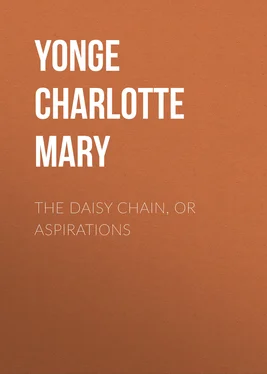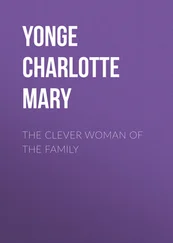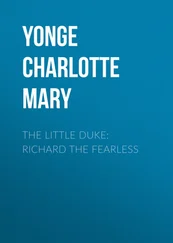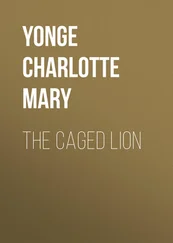Charlotte Yonge - The Daisy Chain, or Aspirations
Здесь есть возможность читать онлайн «Charlotte Yonge - The Daisy Chain, or Aspirations» — ознакомительный отрывок электронной книги совершенно бесплатно, а после прочтения отрывка купить полную версию. В некоторых случаях можно слушать аудио, скачать через торрент в формате fb2 и присутствует краткое содержание. Жанр: foreign_prose, literature_19, Европейская старинная литература, foreign_antique, на английском языке. Описание произведения, (предисловие) а так же отзывы посетителей доступны на портале библиотеки ЛибКат.
- Название:The Daisy Chain, or Aspirations
- Автор:
- Жанр:
- Год:неизвестен
- ISBN:нет данных
- Рейтинг книги:5 / 5. Голосов: 1
-
Избранное:Добавить в избранное
- Отзывы:
-
Ваша оценка:
- 100
- 1
- 2
- 3
- 4
- 5
The Daisy Chain, or Aspirations: краткое содержание, описание и аннотация
Предлагаем к чтению аннотацию, описание, краткое содержание или предисловие (зависит от того, что написал сам автор книги «The Daisy Chain, or Aspirations»). Если вы не нашли необходимую информацию о книге — напишите в комментариях, мы постараемся отыскать её.
The Daisy Chain, or Aspirations — читать онлайн ознакомительный отрывок
Ниже представлен текст книги, разбитый по страницам. Система сохранения места последней прочитанной страницы, позволяет с удобством читать онлайн бесплатно книгу «The Daisy Chain, or Aspirations», без необходимости каждый раз заново искать на чём Вы остановились. Поставьте закладку, и сможете в любой момент перейти на страницу, на которой закончили чтение.
Интервал:
Закладка:
No sooner was young Ernescliffe able to sit up, than Dr. May insisted on conveying him to his own house, as his recovery was likely to be tedious in solitude at the Swan. It was not till he had been drawn in a chair along the sloping garden, and placed on the sofa to rest, that he discovered that the time the good doctor had chosen for bringing a helpless convalescent to his house, was two days after an eleventh child had been added to his family.
Mrs. May was too sorry for the solitary youth, and too sympathising with her husband, to make any objection, though she was not fond of strangers, and had some anxieties. She had the utmost dependence on Margaret’s discretion, but there was a chance of awkward situations, which papa was not likely to see or guard against. However, all seemed to do very well, and no one ever came into her room without some degree of rapture about Mr. Ernescliffe. The doctor reiterated praises of his excellence, his principle, his ability and talent, his amusing talk; the girls were always bringing reports of his perfections; Norman retracted his grumbling at having his evenings spoiled; and “the boys” were bursting with the secret that he was teaching them to rig a little ship that was to astonish mamma on her first coming downstairs, and to be named after the baby; while Blanche did all the coquetry with him, from which Margaret abstained. The universal desire was for mamma to see him, and when the time came, she owned that papa’s swan had not turned out a goose.
There were now no grounds for prolonging his stay; but it was very hard to go, and he was glad to avail himself of the excuse of remaining for the christening, when he was to represent the absent godfather. After that, he must go; he had written to his Scottish cousins to offer a visit, and he had a promise that he should soon be afloat again. No place would ever seem to him so like home as Market Stoneborough. He was quite like one of themselves, and took a full share in the discussions on the baby’s name, which, as all the old family appellations had been used up, was an open question. The doctor protested against Alice and Edith, which he said were the universal names in the present day. The boys hissed every attempt of their sisters at a romantic name, and then Harry wanted it to be Atalantis! At last Dr. May announced that he should have her named Dowsabel if they did not agree, and Mrs. May advised all the parties concerned to write their choice on a slip of paper, and little Aubrey should draw two out of her bag, trusting that Atalantis Dowsabel would not come out, as Harry confidently predicted.
However, it was even worse, Aubrey’s two lots were Gertrude and Margaret. Ethel and Mary made a vehement uproar to discover who could have written Margaret, and at last traced it home to Mr. Ernescliffe, who replied that Flora, without saying why, had desired him to set down his favourite name. He was much disconcerted, and did not materially mend the matter by saying it was the first name that came into his head.
CHAPTER II
Meadows trim with daisies pied.
Ethel’s navigation lesson was interrupted by the dinner-bell. That long table was a goodly sight. Few ever looked happier than Dr. and Mrs. May, as they sat opposite to each other, presenting a considerable contrast in appearance as in disposition. She was a little woman, with that smooth pleasant plumpness that seems to belong to perfect content and serenity, her complexion fair and youthful, her face and figure very pretty, and full of quiet grace and refinement, and her whole air and expression denoting a serene, unruffled, affectionate happiness, yet with much authority in her mildness—warm and open in her own family, but reserved beyond it, and shrinking from general society.
The doctor, on the contrary, had a lank, bony figure, nearly six feet high, and looking more so from his slightness; a face sallow, thin, and strongly marked, an aquiline nose, highly developed forehead, and peculiar temples, over which the hair strayed in thin curling flakes. His eyes were light coloured, and were seldom seen without his near-sighted spectacles, but the expressions of the mouth were everything—so varying, so bright, and so sweet were his smiles that showed beautiful white teeth—moreover, his hand was particularly well made, small and delicate; and it always turned out that no one ever recollected that Dr. May was plain, who had heard his kindly greeting.
The sons and daughters were divided in likeness to father and mother; Ethel was almost an exaggeration of the doctor’s peculiarities, especially at the formed, but unsoftened age of fifteen; Norman had his long nose, sallow complexion, and tall figure, but was much improved by his mother’s fine blue eyes, and was a very pleasant-looking boy, though not handsome; little Tom was a thin, white, delicate edition of his father; and Blanche contrived to combine great likeness to him with a great deal of prettiness. Of those that, as nurse said, favoured their mamma, Margaret was tall and blooming, with the same calm eyes, but with the brilliance of her father’s smile; Flora had greater regularity of feature, and was fast becoming a very pretty girl, while Mary and Harry could not boast of much beauty, but were stout sturdy pictures of health; Harry’s locks in masses of small tight yellow curls, much given to tangling and matting, unfit to be seen all the week, till nurse put him to torture every Saturday, by combing them out so as, at least, to make him for once like, she said, a gentleman, instead of a young lion.
Little Aubrey was said by his papa to be like nothing but the full moon. And there he shone on them, by his mamma’s side, announcing in language few could understand, where he had been with papa.
“He has been a small doctor,” said his father, beginning to cut the boiled beef as fast as if his hands had been moved by machinery. “He has been with me to see old Mrs. Robins, and she made so much of him, that if I take him again he’ll be regularly spoiled.”
“Poor old woman, it must have been a pleasure to her,” said Mrs. May—“it is so seldom she has any change.”
“Who is she?” asked Mr. Ernescliffe.
“The butcher’s old mother,” said Margaret, who was next to him. “She is one of papa’s pet patients, because he thinks her desolate and ill-used.”
“Her sons bully her,” said the doctor, too intent on carving to perceive certain deprecatory glances of caution cast at him by his wife, to remind him of the presence of man and maid—“and that smart daughter is worse still. She never comes to see the old lady but she throws her into an agitated state, fit to bring on another attack. A meek old soul, not fit to contend with them!”
“Why do they do it?” said Ethel.
“For the cause of all evil! That daughter marries a grazier, and wants to set up for gentility; she comes and squeezes presents out of her mother, and the whole family are distrusting each other, and squabbling over the spoil before the poor old creature is dead! It makes one sick! I gave that Mrs. Thorn a bit of my mind at last; I could not stand the sight any longer. Madam, said I, you’ll have to answer for your mother’s death, as sure as my name’s Dick May—a harpy dressed up in feathers and lace.”
There was a great laugh, and an entreaty to know whether this was really his address—Ethel telling him she knew he had muttered it to himself quite audibly, for which she was rewarded by a pretended box on the ear. It certainly was vain to expect order at dinner on Saturday, for the doctor was as bad as the boys, and Mrs. May took it with complete composure, hardly appearing sensible of the Babel which would sometimes almost deafen its promoter, papa; and yet her interference was all-powerful, as now when Harry and Mary were sparring over the salt, with one gentle “Mary!” and one reproving glance, they were reduced to quiescence.
Читать дальшеИнтервал:
Закладка:
Похожие книги на «The Daisy Chain, or Aspirations»
Представляем Вашему вниманию похожие книги на «The Daisy Chain, or Aspirations» списком для выбора. Мы отобрали схожую по названию и смыслу литературу в надежде предоставить читателям больше вариантов отыскать новые, интересные, ещё непрочитанные произведения.
Обсуждение, отзывы о книге «The Daisy Chain, or Aspirations» и просто собственные мнения читателей. Оставьте ваши комментарии, напишите, что Вы думаете о произведении, его смысле или главных героях. Укажите что конкретно понравилось, а что нет, и почему Вы так считаете.












